Stay-at-home dad Maurice David makes it work

ENTREPRENEUR Maurice David said he chose to be a stay-at-home dad while his wife goes to work, so he could be in their children’s lives while they were growing up.
He homeschools his three children while tending to a backyard garden and working from home.
David lives in Wallerfield on just under an acre of land on which he keeps chickens, rabbits, and grows produce. His three children are Zara, eight; Yeva, seven; and Xola, three, whom he raises with his wife, Gem. He has been homeschooling them for four years.
They decided on homeschooling their children after Zara's birth. David said staying at home became an easier decision once his wife was offered a job outside the home.
“We had a small business and it had its ups and downs. I used to be out a lot when the girls were younger, to make up what the business didn’t bring in. I had to do schoolwork with the children, and something always got in the way of doing work.
"We had a good family support system, but it’s not all the time you can get someone to take the children because everyone’s also busy doing their own thing, and when you’re not earning enough money, you can’t hire someone to come in and help all the time.”
He said during covid19, they had been growing and delivering produce and were on the verge of expanding to a physical location.
It was then his wife was offered a job through a friend of a friend. He told her to go ahead, as it would allow her to do the work she was interested in, and he would stay home and take care of the children.

“I made the decision because one, now we would have a guaranteed income from at least one person, and two, the kids really needed looking after. I was looking at their development and we had reached a point we were making so much progress, I didn’t want to have to be moving my schedule around, missing days, and not being able to accomplish and bring them to where I wanted to see them growing in their education.”
David said another reason for the decision was that his mother fell ill and passed away while living in the US.
“I was looking at the relationship we had and I said I wanted to be able to spend more time with my family. I really saw I wanted to be part of my children’s lives, I didn’t want to be missing certain things.
“I didn’t have my mother and father with me all the time growing up. My mother left when I was probably two years old – I don’t remember her as a child, the next time I saw her I was about 12. My father left when I was seven. They both went abroad to pursue education and get a career.
"They never moved back to Trinidad, they created their own life and just got into work and all those things.”
He said he wanted something different.
“I really wanted to have a connection with my children and to build those great moments, and I feel like right now the period before they reach ten, 11, 12, where they start to try to find their own identity, to me I feel like it’s an important time for them for me to be around them.”
David says he provides small business people with business services, working in IT and business technology, while focusing on agriculture.
“Our current business is a small farm. I like the fact that you nurture something, you take care of it and from nothing, once you put the hard work in, you can reap a bountiful harvest. (But) I don’t think we’ve reached a point where we reap enough that we could say it’s profitable, and there are obstacles we face every day.”
He said the children will participate in the farming to different extents.

“Each child has their own personality. Zara likes to do the seedling stages, but she wouldn’t come out into the yard and plant, because when she was younger, she stepped on an ant patch and she was bitten very badly, so it’s difficult to get her out. Xola, the youngest one, follows me everywhere, so once I’m outside, she’s there.”
He said he had added rabbits and chickens recently because he liked the idea of having food, and the children would feed them and make sure they had water.
“We have them in our day-to-day activities in life. One of the best things I like about having (the children) at home is not just the academic areas, but working on the life skills area. They clean up after themselves really well, we ingrained that in them, they take care of their space.
“Zara and Yeva are very interested in cooking, so if my wife is baking something, they will ask her to measure, and they’re very clean and they pay attention.
"They might ask to help cook. If I’m making pancakes I’d mix the batter and allow them to flip some pancakes, and now and again I might let them stir a pot.
"I bought one of those plastic knives you cut cake with and I’ll have them cut up vegetables like tomatoes and cucumbers if I’m in the kitchen for salads and stuff.”
David outlined a typical day in his life. He wakes up when his wife leaves around 7 am, and takes a half-hour or so for himself.
“I start getting breakfast ready around 8 am, and, depending on how willing the girls are, I tend to wake them up between 8.30 am and 9 am. Not all the time that happens, Yeva, if I leave her, she will sleep most of the day.
"After breakfast, we start schoolwork around 10 am, but that doesn’t always happen, so I have to be flexible some days. Usually we do schoolwork till after lunch. I try to spend half an hour with each child and give them independent work for when I’m working with the others, and then swap.
“We have lunch around 1 or 2 pm, and I try to get Xola to take a nap around then.

"In the evenings I try to let them go outside and play from 4 pm to about 6 pm. That way they’re tired and ready to eat dinner when they come in. Bath, then bedtime stories, or some nights they watch a short something just before they go to bed. Either myself or my wife will lie down with them till they fall asleep. We try to have them in bed by 9 pm, and hopefully they fall asleep by 10 pm.”
David said when he has meetings, the schoolwork might happen earlier or later in the day. He has a list of what he wants to do weekly and monthly and once he accomplishes those objectives, he crosses it off.
“Some days we might have to double up at work, and it also depends on the child’s mood, because some days they wake up cranky and their emotions won’t allow them to do work.
“After they fall asleep, my wife and I would sit down together and talk about our days. I will get to bed around 12, 1 am – and do it all over again in the morning.”
David said no two days or weeks are alike.
They also do outdoor family activities, like going to the beach and the library.
“We used to have a dedicated beach day, but we haven’t done that in a while.
"The library in Arima has a lot of good activities, so we’ll go every two weeks and if they have Saturday activities. Zara picked up chess recently: she did a chess tournament in April. She likes reading and will pick out books often.”
Gem David said initially she was not fully sold on the idea, because she worried staying at home would not leave him fulfilled, but it allowed him the breadth to follow his dreams, be the continuous learner that he loved to be and do the type of work that’s fulfilling for him.
“It turned out to be very good for the girls. They started to move ahead leaps and bounds in their schoolwork. They were able to experience things like library excursions, working with Dad and their pets, helping with the chickens, playing chess, etc. so it allowed them to have the attention they needed while being able to advance at their own pace.”
She said it also freed her up to be a better mother and employee and put her best foot forward at work, which opened up doors and opportunities.
“My job is flexible, so I’m working from home at least three days a week. But with him being their primary caregiver, I can get a lot of work done at home as well, while still being able to tend to scrapes, hug them, discipline them, feed them etc. I can still be a mom without it negatively affecting my work. And I can still be a good employee without it affecting my relationship with them and him badly.
“What our lifestyle affords us is that we can each follow our dreams and our family’s goals. The flexibility means that we can all orchestrate our lives in ways that gives us freedom to meet our potential and be all we want to be.”
David said some days being a stay-at-home dad is a lot of work, but he enjoys it. He said his wife also helps him balance the work and can act as a mediator between himself and the children.
“I can’t see myself going out to do a full-time job again. My family and children are my number-one priority and I’m going to stick with it.”

Comments
"Stay-at-home dad Maurice David makes it work"